人教版五年级英语下册Unit3-知识点整理doc资料
- 格式:pdf
- 大小:40.33 KB
- 文档页数:5
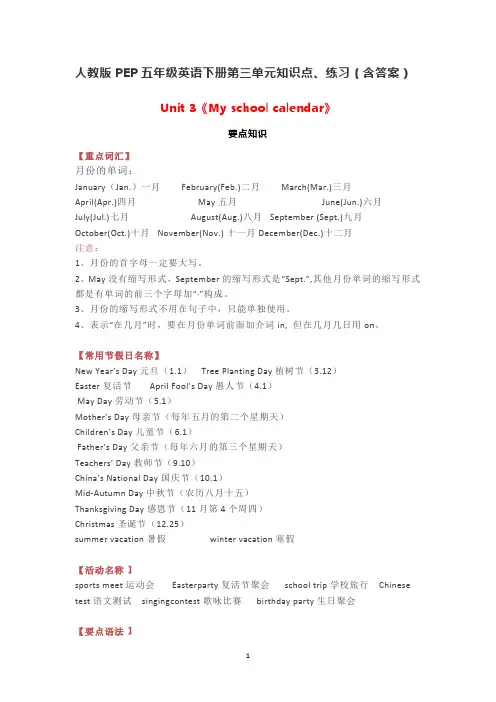
人教版PEP五年级英语下册第三单元知识点、练习(含答案)Unit 3《My school calendar》要点知识【重点词汇】月份的单词:January(Jan.)一月February(Feb.)二月March(Mar.)三月April(Apr.)四月 May五月June(Jun.)六月July(Jul.)七月August(Aug.)八月 September (Sept.)九月October(Oct.)十月 November(Nov.) 十一月 December(Dec.)十二月注意:1、月份的首字母一定要大写。
2、May没有缩写形式,September的缩写形式是“Sept.”,其他月份单词的缩写形式都是有单词的前三个字母加“·”构成。
3、月份的缩写形式不用在句子中,只能单独使用。
4、表示“在几月”时,要在月份单词前面加介词in, 但在几月几日用on。
【常用节假日名称】New Year’s Day元旦(1.1) Tree Planting Day 植树节(3.12)Easter 复活节April Fool’s Day愚人节(4.1)May Day 劳动节(5.1)Mother’s Day母亲节(每年五月的第二个星期天)Children’s Day儿童节(6.1)Father’s Day父亲节(每年六月的第三个星期天)Teachers’ Day教师节(9.10)China’s National Day国庆节(10.1)Mid-Autumn Day 中秋节(农历八月十五)Thanksgiving Day 感恩节(11月第4个周四)Christmas圣诞节(12.25)summer vacation暑假winter vacation寒假【活动名称】sports meet 运动会 Easterparty 复活节聚会 school trip 学校旅行 Chinese test 语文测试 singingcontest歌咏比赛 birthday party生日聚会【要点语法】1. 介词in 、on、at的用法。
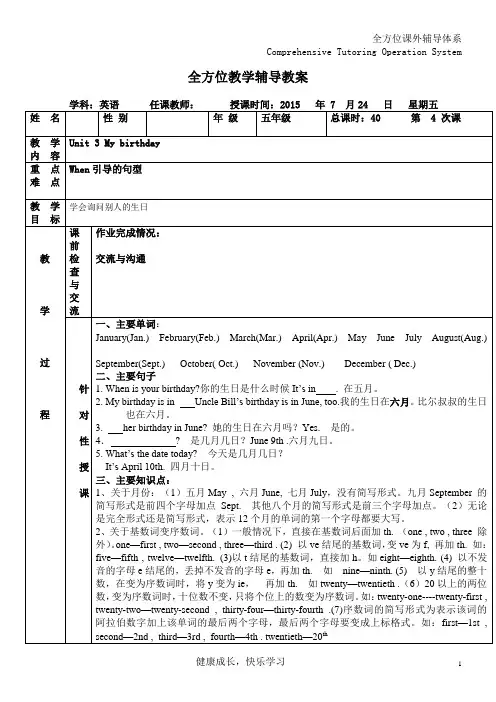
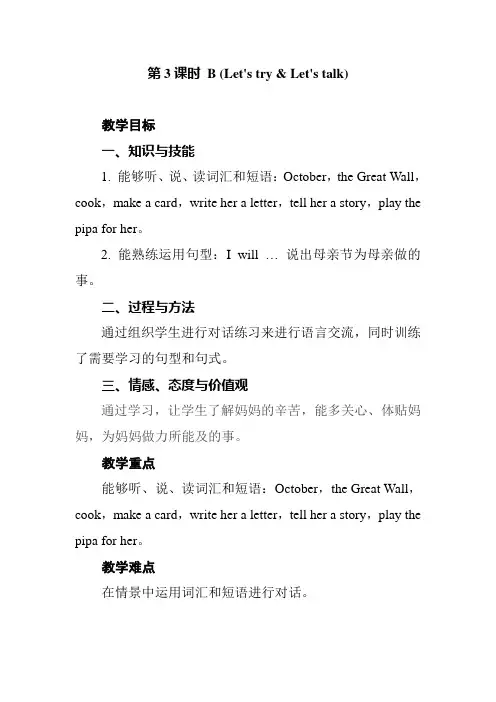
第3课时B (Let's try & Let's talk)教学目标一、知识与技能1. 能够听、说、读词汇和短语:October,the Great Wall,cook,make a card,write her a letter,tell her a story,play the pipa for her。
2. 能熟练运用句型:I will …说出母亲节为母亲做的事。
二、过程与方法通过组织学生进行对话练习来进行语言交流,同时训练了需要学习的句型和句式。
三、情感、态度与价值观通过学习,让学生了解妈妈的辛苦,能多关心、体贴妈妈,为妈妈做力所能及的事。
教学重点能够听、说、读词汇和短语:October,the Great Wall,cook,make a card,write her a letter,tell her a story,play the pipa for her。
教学难点在情景中运用词汇和短语进行对话。
教法导航教师要通过情景创设,来激励学生对知识的输出同时渗透德育教育。
学法导航学生通过讨论,游戏等学习知识。
教学准备多媒体、录音机、挂历、单词卡片等。
教学过程1. Warm-up(热身及预习展示)小游戏:出示各种节日的单词,一人问,全班抢答,随机挑选一个节日,看谁最快能说出在几月。
2.Presentation and practice(精讲点拨)(1)Let's try 老师问:When is your birthday? 找几个学生回答。
然后问快要过生日的同学:What will you have on your birthday? A birthday party or a birthday cake? 展示生日聚会和生日蛋糕的图片,图片上有英文表达:a birthday party,a birthday cake.让学生认识并掌握两者的表达。
(2)放录音。
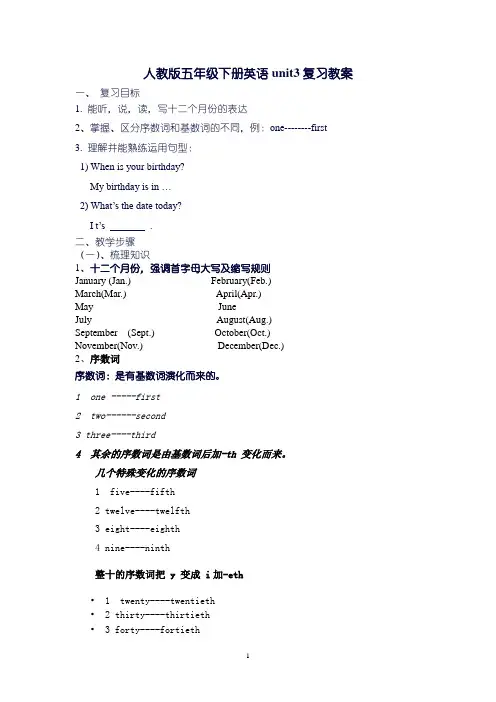
人教版五年级下册英语unit3复习教案一、复习目标1. 能听,说,读,写十二个月份的表达2、掌握、区分序数词和基数词的不同,例:one--------first3. 理解并能熟练运用句型:1) When is your birthday?My birthday is in …2) What’s the date today?I t’s .二、教学步骤(一)、梳理知识1、十二个月份,强调首字母大写及缩写规则January (Jan.) February(Feb.)March(Mar.) April(Apr.)May JuneJuly August(Aug.)September (Sept.) October(Oct.)November(Nov.) December(Dec.)2、序数词序数词:是有基数词演化而来的。
1 one -----first2 two------second3 three----third4 其余的序数词是由基数词后加-th 变化而来。
几个特殊变化的序数词1 five----fifth2 twelve----twelfth3 eight----eighth4 nine----ninth整十的序数词把 y 变成 i加-eth• 1 twenty----twentieth• 2 thirty----thirtieth• 3 forty----fortieth• 4 fifty -----fiftieth• 5 你能写出 sixty seventy eighty ninety 的序数词吗?几十几的序数词,十位数不变,个位数变成序数词• 1. twenty-one 21----twenty-first 21st• 2.thirty-two 32-----thirty-second 32nd• 3.ninety-nine 99----ninety-ninth 99th• 4 .请写出66 83 48 55的序数词。
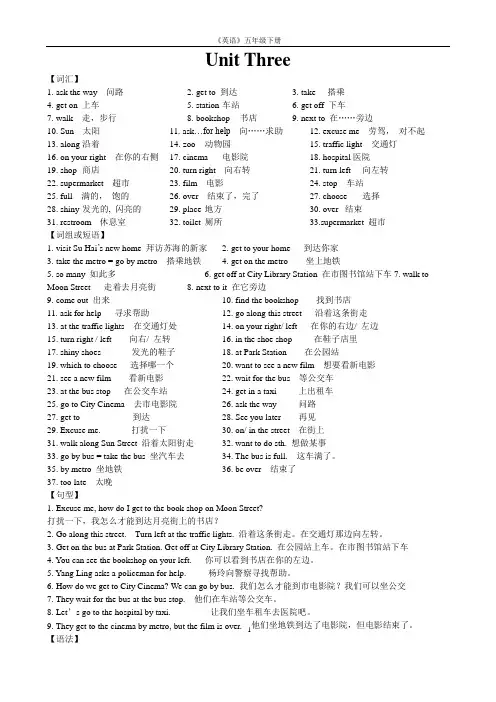
1Unit Three【词汇】1. ask the way 问路2. get to 到达3. take 搭乘4. get on 上车5. station 车站6. get off 下车7. walk 走,步行 8. bookshop 书店 9. next to 在……旁边10. Sun 太阳 11. ask …for help 向……求助 12. excuse me 劳驾, 对不起13. along 沿着 14. zoo 动物园 15. traffic light 交通灯16. on your right 在你的右侧 17. cinema 电影院 18. hospital 医院19. shop 商店 20. turn right 向右转 21. turn left 向左转22. supermarket 超市 23. film 电影 24. stop 车站25. full 满的, 饱的 26. over 结束了,完了 27. choose 选择28. shiny 发光的, 闪亮的 29. place 地方 30. over 结束31. restroom 休息室 32. toilet 厕所 33.supermarket 超市【词组或短语】1. visit Su Hai ’s new home 拜访苏海的新家2. get to your home 到达你家3. take the metro = go by metro 搭乘地铁4. get on the metro 坐上地铁5. so many 如此多6. get off at City Library Station 在市图书馆站下车7. walk to Moon Street 走着去月亮街8. next to it 在它旁边9. come out 出来 10. find the bookshop 找到书店11. ask for help 寻求帮助 12. go along this street 沿着这条街走13. at the traffic lights 在交通灯处 14. on your right/ left 在你的右边/ 左边15. turn right / left 向右/ 左转 16. in the shoe shop 在鞋子店里17. shiny shoes 发光的鞋子 18. at Park Station 在公园站19. which to choose 选择哪一个 20. want to see a new film 想要看新电影21. see a new film 看新电影 22. wait for the bus 等公交车23. at the bus stop 在公交车站 24. get in a taxi 上出租车25. go to City Cinema 去市电影院 26. ask the way 问路27. get to 到达 28. See you later 再见29. Excuse me. 打扰一下 30. on/ in the street 在街上31. walk along Sun Street 沿着太阳街走 32. want to do sth. 想做某事33. go by bus = take the bus 坐汽车去 34. The bus is full. 这车满了。
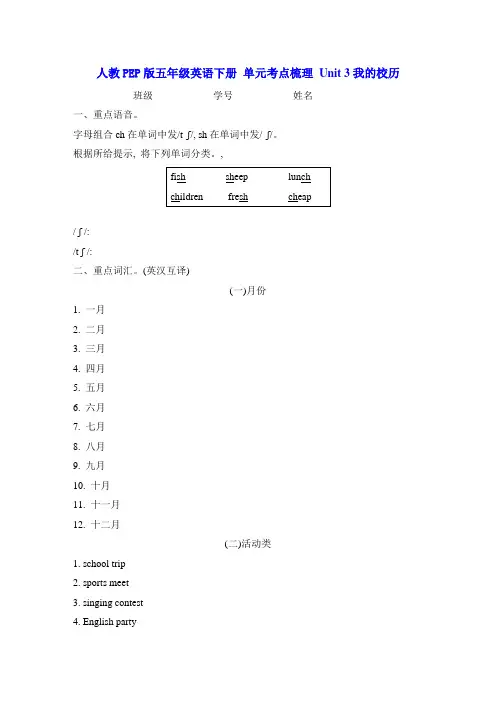
人教PEP版五年级英语下册单元考点梳理Unit 3我的校历班级__________ 学号__________ 姓名__________一、重点语音。
字母组合ch在单词中发/tʃ/, sh在单词中发/ʃ/。
根据所给提示, 将下列单词分类。
,/ ʃ /: ________________________________________/t ʃ /: ________________________________________二、重点词汇。
(英汉互译)(一)月份1. 一月________________________________________2. 二月________________________________________3. 三月________________________________________4. 四月________________________________________5. 五月________________________________________6. 六月________________________________________7. 七月________________________________________8. 八月________________________________________9. 九月________________________________________10. 十月________________________________________11. 十一月________________________________________12. 十二月________________________________________(二)活动类1. school trip________________________________________2. sports meet________________________________________3. singing contest________________________________________4. English party________________________________________(三)节日类1. China's National Day________________________________________2. American Thanksgiving Day________________________________________3. Christmas_________________________________________(四)其他类1. few________________________________________2. thing________________________________________3. meet________________________________________4. trip________________________________________5. year________________________________________6. plant________________________________________7. contest________________________________________8. national________________________________________9. American________________________________________10. game________________________________________11. riddle________________________________________12. act________________________________________13. RSVP________________________________________14. by________________________________________15. a few________________________________________16. the Great Wall________________________________________17. act out________________________________________三、重点句子。
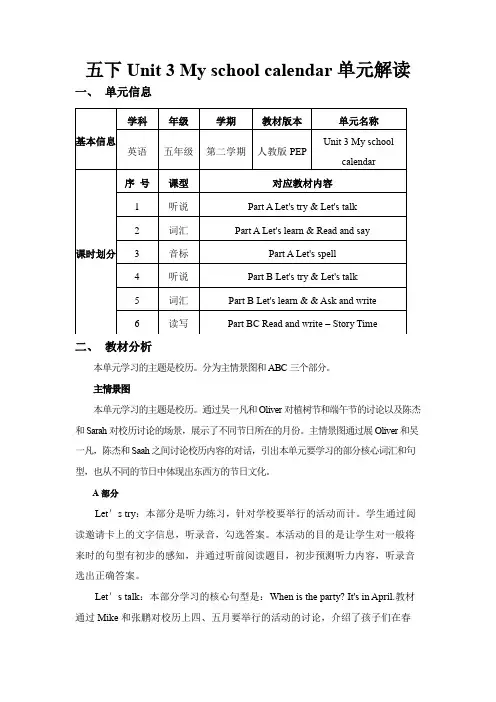
五下Unit 3 My school calendar单元解读一、单元信息二、教材分析本单元学习的主题是校历。
分为主情景图和ABC三个部分。
主情景图本单元学习的主题是校历。
通过吴一凡和Oliver对植树节和端午节的讨论以及陈杰和Sarah对校历讨论的场景,展示了不同节日所在的月份。
主情景图通过展Oliver和吴一凡,陈杰和Saah之间讨论校历内容的对话,引出本单元要学习的部分核心词汇和句型,也从不同的节日中体现出东西方的节日文化。
A部分L et's try:本部分是听力练习,针对学校要举行的活动而计。
学生通过阅读邀请卡上的文字信息,听录音,勾选答案。
本活动的目的是让学生对一般将来时的句型有初步的感知,并通过听前阅读题目,初步预测听力内容,听录音选出正确答案。
Let's talk:本部分学习的核心句型是:When is the party? It's in April.教材通过Mike和张鹏对校历上四、五月要举行的活动的讨论,介绍了孩子们在春天将有很多趣味性活动的情景,即四月的运动会和复活节聚会、五月的春游,让学生感知上述核心句型的语义及语用情景。
Let's learn:本部分学习的单词是:January,February,March,April,May,June。
教材通过Mike和张鹏对校历前六个月活动的讨论,呈现了上述六个有关月份的单词。
本部分的教学目标是:学生能够听、说、读、写六个月份名称;能够在语境中正确运用这六个单词;能够根据实际情况判断句子正误并进行相应的修改。
Read and say:本活动用于操练A Let's learn板块的六个月份的名称。
通过判断正误,讨论不同月份中要庆祝的节日,进一步强化单词的音形义匹配训练,并渗透跨文化知识。
Let's spell:Let's spell分为Read,listen and chant;Listen,number and say 以及Listen,choose,write and say三部分。
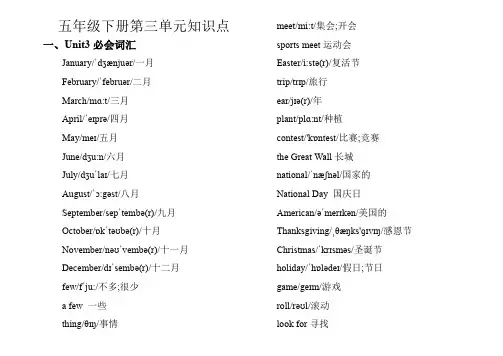
五年级下册第三单元知识点一、Unit3必会词汇January/ˈdʒænjuər/一月February/ˈfebruər/二月March/mɑ:t/三月April/ˈeɪprə/四月May/meɪ/五月June/dʒu:n/六月July/dʒuˈlaɪ/七月August/ˈɔ:gəst/八月September/sepˈtembə(r)/九月October/ɒkˈtəʊbə(r)/十月November/nəʊˈvembə(r)/十一月December/dɪˈsembə(r)/十二月few/fˈju:/不多;很少a few 一些thing/θɪŋ/事情meet/mi:t/集会;开会sports meet运动会Easter/i:stə(r)/复活节trip/trɪp/旅行ear/jɪə(r)/年plant/plɑ:nt/种植contest/'kɒntest/比赛;竞赛the Great Wall长城national/ˈnæʃnəl/国家的National Day 国庆日American/əˈmerɪkən/美国的Thanksgiving/ˌθæŋks'ɡɪvɪŋ/感恩节Christmas/ˈkrɪsməs/圣诞节holiday/ˈhɒlədeɪ/假日;节日game/geɪm/游戏roll/rəʊl/滚动look for寻找chocolate/ˈtʃɒklət/巧克力bunny/ˈbʌni/(用作儿语)兔子RSVP(尤用于请柬)请赐复by/baɪ/在……之前+信件、邮件地址二、Unit3必考短语常用节假日名称:New Year’s Day元旦(公历1.1)The Spring Festival春节(农历腊月三十)Lantern Festival(农历正月十五)Tree Planting Day 植树节(3.12)Easter 复活节(3、4月之间)April Fool’s Day愚人节(4.1)May Day 劳动节(5.1)Mother’s Day母亲节(每年五月的第二个星期日) Children’s Day 儿童节(6.1)Father’s Day父亲节(每年六月的第三个星期日) Party’s Day 建党节(7.1)Army Day 建军节(8.1)Teachers’ Day教师节(9.10)China’s National Day国庆节(10.1)Mid-Autumn Day 中秋节(农历八月十五)Thanks giving Day 感恩节(11月第4个周四)Christmas圣诞节(12.25)summer vacation暑假winter vacation寒假活动名称:sports meet 运动会Easter party 复活节聚会school trip 学校旅行Chinese test 语文测试singing contest歌唱比赛birthday party生日聚会三、Unit3必考句型1、问答某个活动或节日在几月份的句型及回答。
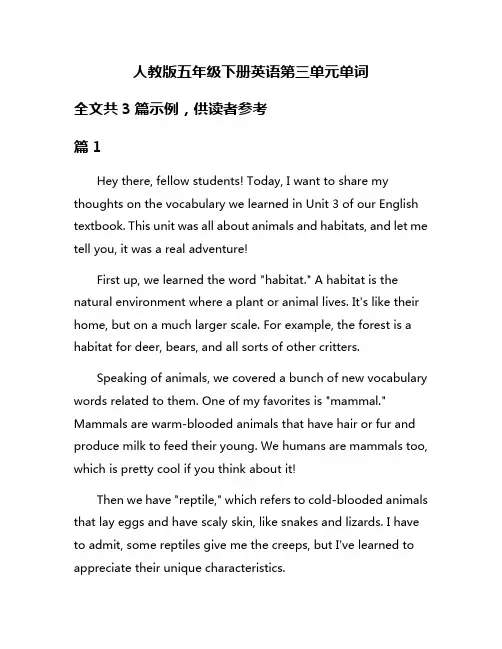
人教版五年级下册英语第三单元单词全文共3篇示例,供读者参考篇1Hey there, fellow students! Today, I want to share my thoughts on the vocabulary we learned in Unit 3 of our English textbook. This unit was all about animals and habitats, and let me tell you, it was a real adventure!First up, we learned the word "habitat." A habitat is the natural environment where a plant or animal lives. It's like their home, but on a much larger scale. For example, the forest is a habitat for deer, bears, and all sorts of other critters.Speaking of animals, we covered a bunch of new vocabulary words related to them. One of my favorites is "mammal." Mammals are warm-blooded animals that have hair or fur and produce milk to feed their young. We humans are mammals too, which is pretty cool if you think about it!Then we have "reptile," which refers to cold-blooded animals that lay eggs and have scaly skin, like snakes and lizards. I have to admit, some reptiles give me the creeps, but I've learned to appreciate their unique characteristics.Next up, "amphibian." These are amazing creatures that can live both on land and in water, like frogs and salamanders. They go through an incredible transformation called metamorphosis, where they change from a larvae (like a tadpole) into an adult. Mind-blowing, right?Moving on, we learned about "invertebrates" – animals without a backbone, like insects, spiders, and worms. The word "invertebrate" might be a mouthful, but these creatures are fascinating in their own way. Did you know that insects make up over 90% of all animal species on Earth? Crazy!Of course, we can't forget about "birds." These feathered friends are warm-blooded, lay eggs, and can fly (most of them, at least). I love watching birds soar through the sky and listening to their beautiful songs.Now, let's talk about some specific habitats we covered. The "jungle" is a dense, tropical forest filled with all kinds of exotic plants and animals. Just thinking about it makes me want to go on an adventure à la Indiana Jones!Then there's the "ocean," which covers a vast portion of our planet and is home to an incredible array of marine life. From tiny plankton to massive whales, the ocean is teeming with diversity.We also learned about the "desert," a dry and often hot environment where plants and animals have adapted to survive with very little water. The idea of camels and cacti in the middle of a sandy wasteland is both fascinating and a little bit intimidating.Moving on to a more familiar habitat, we discussed the "farm." This is where many of the animals we rely on for food and resources, like cows, chickens, and sheep, are raised. It's amazing to think about how humans have domesticated and cared for these animals for thousands of years.Last but not least, we covered the "rainforest," a lush and humid forest found near the equator. These areas are known for their incredible biodiversity, with countless species of plants and animals living together in a delicate balance.Whew, that's a lot of vocabulary to cover! But learning about these animals and their habitats has been such an enriching experience. It's made me appreciate the incredible diversity of life on our planet and the importance of protecting these delicate ecosystems.I hope this little essay has given you a taste of what we've been learning in Unit 3. Who knows, maybe some of you will grow up to be zoologists, conservationists, or even explorers,venturing into the depths of the jungle or the depths of the ocean!Until next time, keep learning and exploring, my fellow word warriors!篇2Unit 3 Vocabulary: A Student's PerspectiveHey there, fellow students! It's me again, your friendly neighborhood English learner. Today, I want to take you on a journey through the wild and wonderful world of vocabulary from Unit 3 of our English textbook. Now, I know what you're thinking: "Vocabulary? Ugh, how boring!" But trust me, these words are anything but dull. In fact, they're the key to unlocking a whole new realm of self-expression and cultural understanding. So buckle up, because we're about to embark on a linguistic adventure like no other!Let's start with one of my personal favorites: "volunteer." This little gem is more than just a fancy way of saying "helper." It's a word that embodies the spirit of selflessness and community service. Whenever I hear it, I can't help but picture those kind-hearted souls who give their time and energy to make the world a better place. Whether it's volunteering at asoup kitchen, planting trees, or tutoring younger kids, there's something truly inspiring about people who choose to volunteer their efforts for the greater good.Next up, we have "campaign." Now, this word might conjure up images of political rallies and election season, but it actually has a much broader meaning. A campaign can be any sort of organized effort to achieve a specific goal, whether it's raising awareness about an important cause or promoting a new product or service. Personally, I love the idea of launching a campaign to make our school cafeteria serve healthier food options. Hey, a kid can dream, right?Speaking of dreams, let's talk about "imagination." This word is like a magic wand that unlocks the boundless realms of creativity and innovation. Without imagination, we'd be stuck in a world of drab monotony, unable to conceive of new ideas or envision alternate realities. But with imagination, the possibilities are endless. We can dream up fantastic stories, invent groundbreaking technologies, or simply daydream about our wildest fantasies. Imagination is the fuel that powers the human spirit, and I, for one, never want to run out of it.Now, let's dive into a word that might make some of you squirm: "challenge." I know, I know, the mere mention of itprobably sends shivers down your spine. But hear me out, because challenges are actually a good thing. They're what push us out of our comfort zones and force us to grow and learn. Whether it's a tough math problem, a difficult physical task, or an emotional hurdle, facing challenges head-on is the only way to truly strengthen our resilience and character. So instead of running away from challenges, let's embrace them as opportunities to become better versions of ourselves.Alright, time for a word that's sure to get your creative juices flowing: "compose." When I hear this word, I immediately think of artists, musicians, and writers pouring their hearts and souls into their craft. But composing isn't just for the artistically inclined; it's a skill that we can all benefit from. Whether we're composing a persuasive essay, a catchy jingle, or a heartfelt poem, the act of composing helps us organize our thoughts, express our emotions, and communicate our ideas in a meaningful way. Plus, there's something deeply satisfying about creating something from scratch, like a masterpiece born from the depths of our imagination.Last but not least, let's talk about "traditional." This word might seem a bit stuffy and old-fashioned, but I beg to differ. Traditions are what connect us to our cultural roots and give us asense of belonging and continuity. Whether it's celebrating a holiday, participating in a cultural festival, or carrying on a family ritual, traditions are the threads that weave together the tapestry of our shared human experience. And while it's important to embrace progress and modernity, it's equally crucial to honor and preserve the traditions that have shaped our identities and communities over the centuries.Well, there you have it, folks – a whirlwind tour of some of the most fascinating words from Unit 3 of our English textbook. But these words are more than just entries in a vocabulary list; they're portals into different realms of thought, emotion, and experience. So the next time you encounter one of these words, don't just memorize its definition – really stop and ponder its deeper meaning and implications. Who knows? You might just discover a whole new way of looking at the world around you.Happy learning, my fellow word warriors!篇3Sure, here's an essay about the vocabulary from Unit 3 of the PEP (People's Education Press) English textbook for Grade 5, written from a student's perspective in English. The length is approximately 2,000 words.Unit 3 Vocabulary: A Student's PerspectiveHey there, fellow students! It's me, your friendly neighborhood word nerd, and I'm here to share my thoughts on the vocabulary from Unit 3 of our PEP English textbook. Buckle up, because we're about to embark on a linguistic adventure that'll leave your brain cells tingling with excitement!Let's kick things off with the word "hobby." Now, we all have those special interests that we love to indulge in, right? Whether it's collecting stamps, playing video games, or even something as quirky as watching paint dry (no judgment, folks!), these hobbies are what make us unique individuals. And let's be real, learning new vocabulary can be a hobby in itself – a delightfully nerdy one, but hey, we embrace our inner geeks here!Speaking of embracing our quirks, how about the word "interest"? It's like the cool older sibling of "hobby," but with a slightly more sophisticated vibe. Think about it – we all have those subjects that pique our curiosity, whether it's ancient history, quantum physics, or the intricate world of competitive bread-baking (yes, that's a thing!). Cultivating our interests keeps our minds sharp and our spirits high, and that's something worth celebrating.Now, let's talk about "collect." Admit it, we've all been guilty of amassing collections of random objects at some point in our lives. From baseball cards to seashells to those funky-shaped erasers that we all thought were so cool back in the day, collecting things is a universal human experience. And who knows, maybe one day our collections will be worth a fortune! (Hey, a kid can dream, right?)Moving on, we have the word "album." In the modern age of digital streaming, it's easy to forget the magic of physical albums. But let's not discount the joy of flipping through the pages of a photo album, reliving cherished memories and reminiscing about the good old days. Or, for our more musically inclined peers, the thrill of holding a brand-new album by your favorite artist, eagerly awaiting the sonic adventure that awaits.And let's not forget the word "calendar." Sure, it might seem like a mundane concept, but think about it – without calendars, how would we keep track of all the important dates in our lives? Birthdays, holidays, test dates (ugh, those pesky things), and even the release dates of our favorite video games or movies –they're all neatly organized in our trusty calendars. Plus, let's be honest, there's something deeply satisfying about crossing offdays or events as we progress through the year. It's like a little victory dance for our inner organizational geeks!But wait, there's more! We can't talk about Unit 3 vocabulary without mentioning "festival." Festivals are like the ultimate celebration of life, culture, and community. Whether it's a vibrant music festival where we can jam out to our favorite tunes, or a traditional cultural festival that honors our heritage, these events are a reminder of the rich tapestry of human experiences that surrounds us. And let's not forget the food – festival food is a whole other level of deliciousness that we simply can't resist!Last but not least, we have the word "celebration." From birthday parties to graduations to national holidays, celebrations are those special moments where we come together to honor milestones, achievements, and the joys of life itself. They're a chance to let loose, have fun, and create lasting memories with our loved ones. And who doesn't love a good celebration, complete with cake, balloons, and maybe even a few embarrassing dance moves thrown in for good measure?So there you have it, my fellow word warriors – a whirlwind tour of the vocabulary from Unit 3 of our PEP English textbook. These words may seem simple on the surface, but they hold the power to unlock worlds of meaning, creativity, and personalexpression. Embrace them, cherish them, and let them inspire you to explore the vast realms of language and life itself. Because at the end of the day, words are not just letters on a page –they're the building blocks of our stories, our dreams, and our shared human experience.Happy learning, and may the words be ever in your favor!。
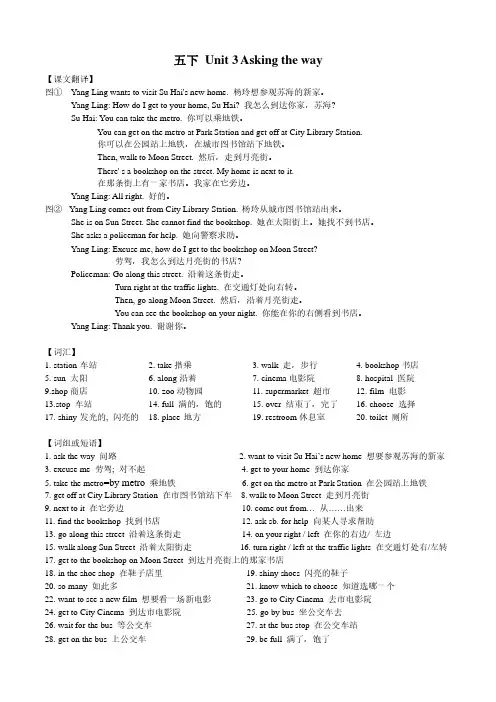
五下Unit 3 Asking the way【课文翻译】图①Yang Ling wants to visit Su Hai's new home.杨玲想参观苏海的新家。
Yang Ling: How do I get to your home, Su Hai?我怎么到达你家,苏海?Su Hai: You can take the metro.你可以乘地铁。
You can get on the metro at Park Station and get off at City Library Station.你可以在公园站上地铁,在城市图书馆站下地铁。
Then, walk to Moon Street.然后,走到月亮街。
There' s a bookshop on the street.My home is next to it.在那条街上有一家书店。
我家在它旁边。
Yang Ling: All right.好的。
图②Yang Ling comes out from City Library Station.杨玲从城市图书馆站出来。
She is on Sun Street.She cannot find the bookshop.她在太阳街上。
她找不到书店。
She asks a policeman for help.她向警察求助。
Yang Ling: Excuse me, how do I get to the bookshop on Moon Street?劳驾,我怎么到达月亮街的书店?Policeman: Go along this street.沿着这条街走。
Turn right at the traffic lights.在交通灯处向右转。
Then, go along Moon Street.然后,沿着月亮街走。
You can see the bookshop on your night.你能在你的右侧看到书店。
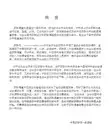
Unit 3 My school calendar 教学设计(Readand write)一、教学内容分析本节课选自由人民教育出版社出版的《义务教育科教书•英语(PEP)》五年级下册第三单元My school calendar B部分的Read and write. 该Read and write 的主体部分是Wu Yifan和Robin准备的一份关于复活节派对的邀请函。
这个Read and write分为读、写两个部分:第一部分要求学生能够在图片的帮助下读懂邀请函,完成读后句子正误判断的活动;第二部分为语境下的书写活动:要求学生能够参考例词和运用核心句型书写一份邀请函。
本单元的主题是校历,主要要涉及不同节日所在的月份,而在Read and write 中的Easter Day是西方的节日,故本课时除了让学生关注邀请函的文体格式外,还实现节日文化意识的渗透。
二、学生情况分析本课的教学对象是五年级的学生,在进入本课学习之前,学生已经学习了12个月份的单词、中西传统节日名称和节日活动短语,以及核心句型:We will …五年级的学生活泼好动,思维活跃,乐于模仿和参与活动,三、教学目标通过借助图片、跳读和细读等方法读懂邀请函、理解文章意思;通过模仿录音,以正确的语音语调朗读文章;并根据所设定的情景,参考例词,运用核心句子I’ll …制作节日邀请函。
四、教学重难点1. 教学重点:能够借助图片正确理解roll Easter eggs,look for eggs,eat chocolate eggs,meet the Easter Bunny以及邀请函的内容,并完成相应的理解练习并在有意义的语境中书写句子We will …2. 教学难点:能够根据设定情景制作一封邀请函。
五、教学过程Step 1 Warm-up1. Free talk教师与学生进行日常交流,讨论天气、当下的月份和季节,以及询问学生最喜欢的月份及原因。
5BUnit31.January 1.一月/ˈdʒænjuəri/ 例:在一月。
eg.It’s in January.2.February 2.二月/ˈfebruəri/ 例:在二月。
eg.It’s in February.3.March 3.三月/mɑ:tʃ/ 例:在三月。
eg.It’s in March.4.April 4.四月/'eɪprəl/ 例:在四月。
eg.It’s in April.5.May 5.五月/meɪ/ 例:在五月。
eg.It’s in May.6.June 6.六月/dʒu:n/ 例:在六月。
eg.It’s in June.7.July7.七月/dʒuˈlaɪ/ 例:在七月。
eg.It’s in July.8.August 8.八月/΄ɔ:ɡəst/ 例:在八月。
eg.It’s in August.9.September 9.九月/sep'tembə(r)/ 例:在九月。
eg.It’s in September.10.October10.十月/ɒk'təubə(r)/ 例:在十月。
eg.It’s in October.11.November11.十一月/nəu'vembə(r)/ 例:在十一月。
eg.It’s in November.12.December 12.十二月/dɪ'sembə(r)/ 例:在十二月。
eg.It’s in December.13.few 13.不多;很少/fju:/ 例:一些eg.a few14.thing 14.事情/θɪŋ/例:我们有一些有趣的事情。
eg.We have a few fun things.15.meet 15.集会;开会/mi:t/ 例:运动会eg.sports meet16.Easter 16.复活节/'i:stə(r)/ 例:我们有一个复活节派对。
eg.We have an Easter party.17.trip 17.旅行/trɪp/ 例:我们有一场学校旅行。
人教版P E P小学英语五年级下册u n i t1至u n i t3知识点归纳-CAL-FENGHAI.-(YICAI)-Company One1五年级下册Unit 1-3重点难点、单元单词、短语和知识点知识梳理第一单元知识点一、主要单词:do morning exercises晨练,做早操 eat breakfast吃早饭 have English class上英语课 play sports进行体育活动 eat dinner吃晚饭 eat lunch吃午饭 climb mountains爬山 go shopping购物,买东西 play the piano弹钢琴 visit grandparents看望(外)祖父母 go hiking去远足二、主要句子:When do you eat dinner你什么时候吃晚饭I eat dinner at 7:00 in the evening.我晚上七点吃晚饭。
When do you get up你什么时候起床I usually get up at 12:00 at noon.我通常在中午12点起床。
What do you do on the weekend你在周末干什么Usually I watch TV and go shopping.我通常看电视和购物。
Sometimes I visit my grandparents.有时候我去看望我的外祖父母。
I often play football.我经常踢足球。
Sometimes I go hiking.有时候我去远足。
三、同义词eat breakfast—have breakfast eat lunch—have luncheat dinner—have dinner play sports—do sports usually—often复数形式:policeman—policemen policewoman—policewomen现在分词:tell—telling三单:say—says同义句:What do you do ---What are you你是干什么的四、表示频度的副词:always总是,一直 usually通常,常常 often经常 sometimes有时候五、以复数形式出现的词组:visit grandparents plant trees介词后跟表示时间的词语时,表示在某年、某月、某个季节,某个时候(在上午,在下午,在晚上)用in;表示在某一天,在星期几用on,在具体的几点几分用at.七、too 和either的用法区别:too和either都是“也”的意思,但too用于肯定句,either用于否定句。
人教精通版五年级下册Unit1-Unit3期中知识汇总人教精通版五年级下册unit 1 知识汇总一、词汇library 图书馆 borrow (向某人、从某人)借 borrow books 借书 meeting room 会议室have a meeting 开会welcome 欢迎meet 相遇、开会our 我们的English lesson 英语课language lab 语言实验室science lesson 科学课science lab 科学实验室 we 我们have 有all 所有;全部 like 喜欢very much 非常;很 art club 美术(艺术)俱乐部paint a picture (用颜料)绘画 music club 音乐俱乐部play the piano 弹钢琴many 许多 way 路;道路 please 请also 也;同样二、句子1. Welcome to our school! 欢迎来到我们的学校。
2. We often borrow books from the library. 我们经常从图书馆借书。
3. We’ll show you around our school. 我们会带你参观我们的学校。
4. This way, please. 这边请。
5. This is our science lab. 这是我们的科学实验室。
6. Do you often come to the library? 你经常来图书馆吗?7. How many English lessons do you have in a week? 你们一周有几节英语课?8. How many science lessons do you have in the science lab? 你们在科学俱乐部有几节科学课?9. We have one science lesson in the science lab. 我们在科学俱乐部有一节科学课。
人教版P E P五年级英语下册各单元知识点集团档案编码:[YTTR-YTPT28-YTNTL98-UYTYNN08]PEP五年级英语下册各单元知识点Unit1Myday一、重点词汇。
1.四会词汇:eatbreakfast吃早饭have···class上······课playsports进行体育运动exercise活动;运动domorningexercises做早操eatdinner吃晚饭cleanmyroom打扫我的房间goforawalk散步goshopping去买东西;购物take学习;上(课)dancing跳舞;舞蹈takeadancingclass上舞蹈课2.三会词汇:when什么时候after在(时间)后start开始usually通常地;惯常地Spain西班牙late晚;迟a.m.午前;上午p.m.午后;下午why为什么shop去买东西;购物work工作last上一个的;刚过去的sound听起来好像also还;也busy忙的need需要play戏剧;剧本letter信live居住island岛always总是;一直cave山洞;洞穴goswimming去游泳win获胜二、其他日常活动。
getup起床eatlunch吃午饭gotobed上床睡觉washmyface洗脸washmyclothes洗我的衣服watchTV看电视playping-pong打乒乓球playthepipa弹琵琶goswimming去游泳gorunning去跑步dohomework做作业dokungfu练武术playfootball踢足球playbasketball打篮球三、频度副词。
always总是,一直(100%)usually通常(80%)often经常(60%)sometimes(30%)有时四、疑问词。
when什么时候why为什么五、重点句型。
Book 5 b Unit 3 My Birthday一 、知识点归纳词汇Dec. December ( 十二月 )Jan. January ( 一月 ) winterFeb. February ( 二月 Mar. March ( 三月 )Apr. April ( 四月 ) spring月 份 May ( 五月 ) monthJune (六月)July (七月) summerAug. August( 八月 )Sept. September (九月 ) Oct. October( 十月 )fallNov. November (十一月)三会单词first (第一) second (第二 )third (第三 ) 序数词 fourth ( 第四 ) ordinal fifth (第五 numbereighth (第八 )ninth (第九 ) twelfth ( 第十 ) twentieth(第二十 )birthday(生日)其他uncle (叔叔,舅舅)her ( 她的 )date(日期 )chart图表cousin堂(表)兄弟 / 姐妹 send发送,e-card 电子卡片able 能everyone每个人then那么二 重点句型1 问时间① —— When is your birthday ?你的生日是什么时候?—— My birthday is inJune .我的生日在六月。
——It ’s in在六月JuneMy birthday is in June. Uncle Bill’ s birthday is in June, too. 我的生日在六月。
比尔叔叔的生日也在六月。
② —— Is her birthday inJuly ? 她的生日是在七月吗?—— Yes , it is . 是的。
( 注:月份前面用 in )2 询问日期—— What ’s the date today/What date is it today ? (今天几号 / 今天是几月几日?)—— It ’ s June 1st .(今天六月一号 )句子: How many birthdays are in October ?有几个人的生日在十月? T here are 3区分:—— What day is it today ?(今天星期几?)—— It ’ s Sunday .(今天星期天。